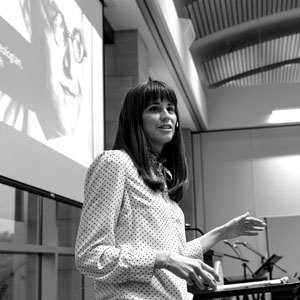She Found a Powerful Ministry in the Practice of Theology
March 30, 2020 | Alumni, Public

Cambria Kaltwasser, MDiv ’10, PhD ’17, was little when she started to ask big questions.
Growing up in Tulsa, Oklahoma, she would engage her father in discussions about the mysteries of human existence.
Her father, Daniel Thimell, is a longtime congregational minister in the United Church of Christ and a theology professor at Oral Roberts University. He has a well-stocked home library, which Kaltwasser frequently raided, devouring everything from spiritual works by C.S. Lewis and Karl Barth to classic novels and short stories.
Those early experiences — spiritual and intellectual — in conversation, reading, and worship awakened a love of theology in Kaltwasser. For her, theology was more than an academic discipline: It was a “confessional discipline” and a response to God’s grace.
“In a very traditional way my dad bequeathed me the story of God’s grace through Jesus Christ,” she says. ”But there was always this sense of searching or a quest to understand how God works in the world. As I felt called to proclaim God’s good news, I understood the study of theology as a way toward that end.”
That calling eventually led Kaltwasser to Princeton Theological Seminary, where she earned a Master of Divinity and a PhD in systematic theology.
But it didn’t happen right away.
She initially shied away from studying theology.
Kaltwasser majored in English at John Brown University in Arkansas, nourishing her spirituality by studying the works of such writers as Fyodor Dostoyevsky and Flannery O’Connor.
“The texts I gravitated toward were the ones that searched the depths of what it meant to be a human in light of God,” Kaltwasser says.
A turning point came in her junior year, when she did a semester at Oxford University in a program offered through the Council for Christian Colleges & Universities. She chose to focus on theology, in part because it enabled her to study Karl Barth, whose book, Dogmatics in Outline, was among those she had discovered in her dad’s library.
As she neared graduation, Kaltwasser was torn. She adored the humanities, especially poetry, and considered pursuing further studies in English literature.
But her natural inclination toward theology was asserting itself.
“In the end, I wanted to talk about truth and God more than I wanted to talk about literary forms,” she says. “I couldn’t see myself going to graduate school to analyze text without getting to talk about truth.”
She was drawn to Princeton Seminary in part because of its strong connection to Barth, including through the Center for Barth Studies. She ended up becoming a Barth scholar, writing her dissertation on the work of the seminal Swiss theologian. She was also a Fulbright scholar at the University of Tübingen in Germany.
The highlight of her time at the Seminary for her was working with “giants” — accomplished scholars like John R. Bowlin, the Robert L. Stuart Professor of Philosophy and Christian Ethics, and George Hunsinger, the Hazel Thompson McCord Professor of Systematic Theology.
She also felt enriched by the way Princeton Seminary brought together a diverse mix of students, some going into church professions and others pursuing callings in social justice, public policy, or education.
“Even as we were studying these really high questions concerning who God is and what goodness is, there was an understanding that these weren’t just ends in themselves,” she says. “For the professors and for the students, there was always a sense that we are called to faithfully participate in God’s reconciling work in the world.”
In 2017, shortly after earning her doctorate, Kaltwasser was hired as an assistant professor of theology at Northwestern College in Iowa and was ordained as a minister of word and sacrament in the Presbyterian Church (USA).
At Northwestern, a Christian college in the Reformed tradition, she teaches courses in theology and in the Christian life. Educating undergraduates presents some intriguing challenges, she says. Although most of the students taking her course on historical theology, for example, are Christians, they typically are pursuing secular careers and are not necessarily passionate about theology.
“I try convince those who are Christian that we are all witnesses to the God to whom we claim allegiance,” Kaltwasser says. “Theology is about testing that witness, testing how we speak about God, and testing how we act in the world, whether it’s as a nurse or a business executive.”
Meanwhile, she is enjoying building her post-seminary life. She and her husband, Jared, live in a farmhouse a few miles north of the Orange City campus. She is making friends with colleagues from other disciplines, doing occasional preaching at local churches, and planning future writing projects.
She also thinks a lot about the role of the theologian and what shape it will take as the world moves into the 2020s. The model for public theology, she says, remains the Rev. Martin Luther King, Jr. for his speaking out in a prophetic voice against racial injustice, employing a powerful language of faith that excluded no one.
Today, with the crisis at the U.S.-Mexican border, Kaltwasser says the time is ripe for theologians to step forward and embrace that same tradition.
“We’re seeing children being separated from their families and refugees being turned away,” she says. “And yet we have a God in the Bible who emphasizes again and again that we are to welcome the stranger.”
While contemplating “how to faithfully participate in God’s reconciling work in the world” — as she has put it — she still has a ready-and-willing discussion partner in her father.
“Both of us agree that theology is never done,” Kaltwasser says. “We never get to the point where we get it all figured out. God is always surprising us, pushing open the boxes that we put God in.”





